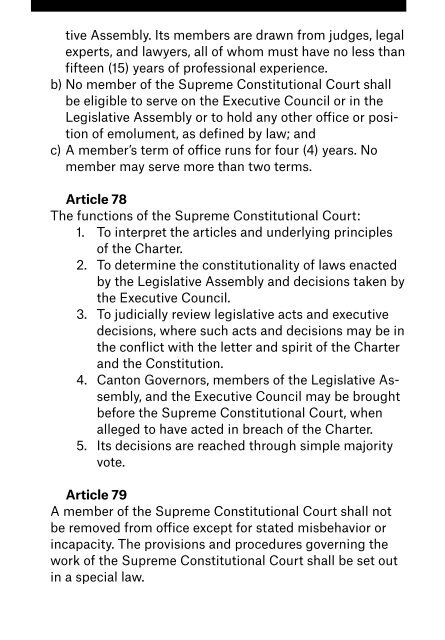Stateless Democracy
1RHiH4Y
1RHiH4Y
You also want an ePaper? Increase the reach of your titles
YUMPU automatically turns print PDFs into web optimized ePapers that Google loves.
tive Assembly. Its members are drawn from judges, legal<br />
experts, and lawyers, all of whom must have no less than<br />
fifteen (15) years of professional experience.<br />
b) No member of the Supreme Constitutional Court shall<br />
be eligible to serve on the Executive Council or in the<br />
Legislative Assembly or to hold any other office or position<br />
of emolument, as defined by law; and<br />
c) A member’s term of office runs for four (4) years. No<br />
member may serve more than two terms.<br />
Article 78<br />
The functions of the Supreme Constitutional Court:<br />
1. To interpret the articles and underlying principles<br />
of the Charter.<br />
2. To determine the constitutionality of laws enacted<br />
by the Legislative Assembly and decisions taken by<br />
the Executive Council.<br />
3. To judicially review legislative acts and executive<br />
decisions, where such acts and decisions may be in<br />
the conflict with the letter and spirit of the Charter<br />
and the Constitution.<br />
4. Canton Governors, members of the Legislative Assembly,<br />
and the Executive Council may be brought<br />
before the Supreme Constitutional Court, when<br />
alleged to have acted in breach of the Charter.<br />
5. Its decisions are reached through simple majority<br />
vote.<br />
Article 80<br />
Procedure for determination of the constitutionality of laws:<br />
1. The decision for the non-constitutionality of any law will<br />
be as follows:<br />
a) Where, prior to a law’s enactment, more than twenty<br />
(20) percent of the Legislative Assembly objects<br />
to its constitutionality, the Supreme Constitutional<br />
Court is seized of the matter and shall render its<br />
decision within fifteen (15) days; if the law is to<br />
be urgently enacted, a decision shall be rendered<br />
within seven (7) days.<br />
b) Where, following the rendering of the judgment<br />
of the Supreme Constitutional Court, more than<br />
twenty (20) percent of the Legislative Assembly<br />
still objects to its constitutionality, an appeal may<br />
be lodged.<br />
c) If, on appeal, the Supreme Constitutional Court<br />
rules the law to be enacted as unconstitutional, the<br />
law shall be considered null and void.<br />
2. If an argument is raised in a court concerning the constitutionality<br />
of a law as follows:<br />
a) If parties to a case raise a challenge to the constitutionality<br />
of a law and the court so holds, the matter<br />
is stayed while it is referred to the Supreme Constitutional<br />
Court.<br />
b) The Supreme Constitutional Court must deliver its<br />
judgment within thirty (30) days.<br />
152–153<br />
Article 79<br />
A member of the Supreme Constitutional Court shall not<br />
be removed from office except for stated misbehavior or<br />
incapacity. The provisions and procedures governing the<br />
work of the Supreme Constitutional Court shall be set out<br />
in a special law.<br />
Part IX. General Rules<br />
Article 81<br />
The Charter applies within the Autonomous Regions. It<br />
may only be amended by a qualified majority of two-thirds<br />
(2/3) of the Legislative Assembly.



